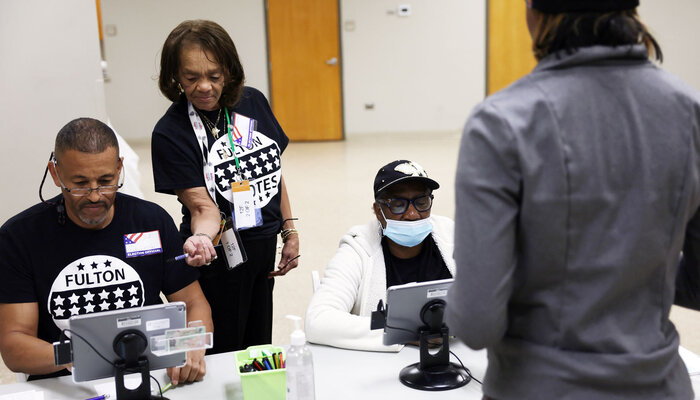For over a decade, Rick Ertel, a retired lawyer in rural Texas, has served as an election worker. In 2022, he checked photo IDs, verified voter registrations, and handed voters ballots at Kerr County’s Precinct 440 as an election clerk. Only that year, something had changed in Texas. In the aftermath of former President Trump’s claims of a “rigged” election, the state enacted Senate Bill 1, a wide-ranging voter suppression law that established burdensome restrictions and penalties for voters, election workers, and volunteers.
It’s one of many new laws around the country justified as countering voter fraud. In reality, widespread voter fraud does not exist — yet these laws impose significant obstacles to the democratic process, especially for communities of color. And Texas’s S.B. 1, enacted in 2021, stands apart for the breadth of its provisions targeting voting access.
The Brennan Center, the Mexican American Legal Defense and Educational Fund, and other co-counsel are challenging the law in federal court on behalf of election workers, community groups, civil rights and voting organizations, and faith-based groups. Among other things, the lawsuit alleges that S.B. 1 violates the Voting Rights Act, hinders voting assistance for people with language barriers or disabilities, and intentionally discriminates against African American and Latino voters.
The challenge to S.B. 1, LUPE v. Texas, is currently playing out in federal court in San Antonio. One provision in the law makes it a crime for poll workers to “take any action” that would make a partisan poll watcher’s observation “not reasonably effective.” In Texas, both election clerks and election judges are poll workers. Election judges are supervisory poll workers who, with the help of election clerks, are responsible for making the voting process go smoothly.
Ertel, who previously served as an election judge, wasn’t intending to work the polls in 2022. He only reluctantly agreed to serve as an election clerk since his polling location was desperate for one, and he figured that the responsibility of dealing with a misbehaving poll watcher fell on the election judge, not a clerk.
Testifying about the poll watcher provision, Ertel said, “I don’t really understand what you are supposed to do as a result of this. . .. I’m not sure that the poll workers know when they are or aren’t obstructing the view of the [poll] watcher given the configuration [of the polling site] and I have no idea what it means to be not reasonably effective.”
In addition to the ambiguity and uncertainty the poll watcher provision added, it also imposed civil and criminal penalties. As a result, Ertel said, “I can’t in good faith suggest to people that they should go be a poll worker and fulfill the civic duty that they have been doing.”
Ertel is one of several election workers who testified during the trial, particularly about fears over poll watchers after the contentious and conspiracy-fueled 2020 election. According to Yvonne Ramon, the former elections administrator for Hidalgo County, a poll watcher at an early voting site in 2020 accused a voter of not looking like a U.S. citizen and demanded to see the voter’s identification. Bexar County Elections Administrator Jacqueline Callanen testified that, at the end of early voting in 2022, a poll watcher followed her and another staff member into a building used for the ballot counting process. A deputy sheriff who accompanied them told Callanen after, “right behind you, the whole time, he had a gun.”
S.B. 1’s hamstringing of election officials in their ability to protect voters and themselves from poll watcher harassment is particularly troubling amid the barrage of death threats, online harassment, and abuse they have experienced in the post-2020 landscape.
The result: poll worker shortages and recruiting difficulties. The Brennan Center’s April 2023 survey of local election officials from around the country found that about 1 in 5 either began serving after the 2020 cycle or say they are very or somewhat unlikely to serve in the 2024 election.
Harris County, the state’s most populous, saw a sharp drop in election judges in 2022 at least in part due to S.B. 1. Rachelle Obakozuwa, the director of logistics for the Harris County elections administrator, testified, “We’ve had conversations with the election workers who told us that because of the fear they have over the legal consequence of what occurs with the poll watcher, that they just didn’t feel they wanted to participate.”
The strain of S.B. 1 isn’t only affecting election workers. The testimony at trial opened an illuminating window into the law’s detrimental effects on the entire voting process in a state where it is already difficult to vote. Left unchecked, laws like S.B. 1 could keep harmful provisions on the books and eligible voters disenfranchised.
Look no further than Louis Perales, a retired postal worker and former U.S. marine, who has voted by mail in Texas for the past five years. In March 2022, his ballot for the primary was rejected due to a provision in S.B. 1 requiring voters to include either the last four digits of their social security number or their full driver’s license number on both their mail ballot application and on the inside flap of the envelope when sending in the mail ballot itself. Perales didn’t include either number on his mail ballot, and his vote was not counted.
“Me being a postman, I should have caught that,” he testified. “But I didn’t because who puts information on the inside of a flap? That’s for the glue to make sure that your letter is in the envelope and stays there.” Indeed, the judge presiding over the case recently found that the identification requirement that tripped up Perales violates federal law.
While the case plays out ahead of next year’s presidential election, the repercussions of S.B. 1 continue to reverberate across the state. When asked if, under the law, he plans to serve as an election judge as he has in the past, Ertel unequivocally replied, “As long as it’s in effect, I’ll never serve again.”






